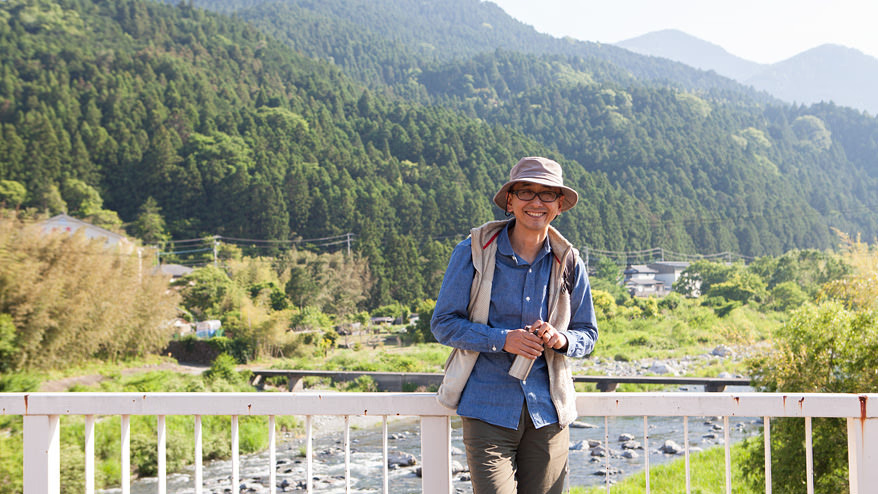The second part of "The Circling Ruler," an interview with Nishimura Yoshitetsu.
In the first part , we heard from Nishimura about his recent thoughts on the shift in interest from "work style" to "way of living" that integrates work and life.
The second part talks about Nishimura's relationship with Monosus and his meeting with Manabe, which led to his connection with Monosus.
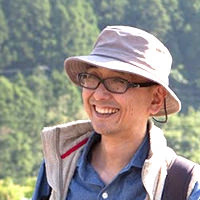
Profile of Yoshiaki Nishimura :
After working in the field of architecture, he is now mainly active in three areas of work: "creating, writing, and teaching." His "creating" axis is his design work at Living World, his "writing" axis is his writing on topics such as "Creating Your Own Job" and ways of working, living, and lifestyles, and his "teaching" axis is his work teaching how to listen and interact, mainly through interview workshops.
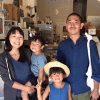
Taichi Manabe Profile :
Monosus Production Department Manager. After working at an advertising production company, he joined Monosus in July 2012. He met Nishimura again at work in 2014, and by coincidence, moved to Kamiyama Town, Tokushima Prefecture in March of that year, at the same time as the Nishimura couple. He began working in two locations, Tokyo and Tokushima. In order to create corporate value by connecting with society and "working like you live," he is currently using his family as a test subject. Since April 2016, he has also served as COO of Food Hub Project Co., Ltd., which was jointly launched by Kamiyama Town and Kamiyama Tsunagu Public Corporation, of which Nishimura is also a member.
Monosus is a unique company
Manabe
I'm currently working on something for Kamiyama Town, and I'd like to move on to talking about Monosas and Nishimura-san. The biggest thing I've done is created a website for Kamiyama Town .
Nishimura was in charge of planning, and Monosus members, including CEO Hayashi, were involved and worked together with him.
So, what was it like working together?
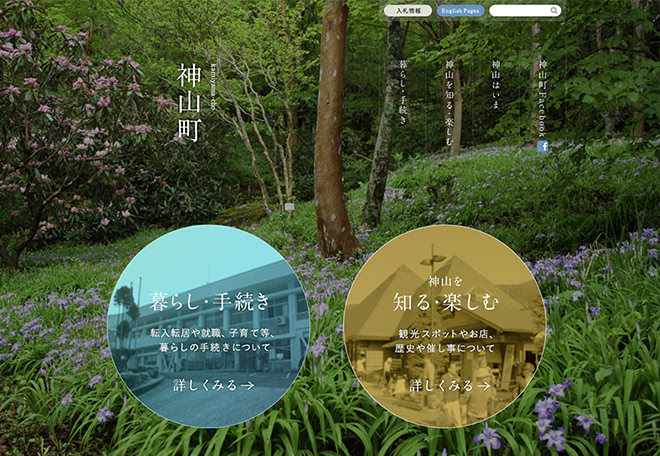
Kamiyama Town Hall website, renewed in December 2015
Nishimura-san (hereinafter: Nishimura)
What was it like working together?
Well, I guess it felt good.
Manabe
What do you mean?
Nishimura
Well, I guess you could say they try to do what's just right for us.
There isn't really an attitude of "Let's take it in the direction we want to go."
Well, that's obvious (laughs).
It's obvious, but I wonder why.
For example, there are some architects who feel like they should be able to make what they want.
Even on websites, there are people like that.
On the other hand, I've become a complete errand boy, just doing what I'm told.
There are people who only do work that is based on specifications.
In that sense, it really is a great place.
He is sensitive to the other person and knows how to interact with them in just the right way.
I had the impression that it was easy to work with him.
It's not like, "This is our style, and this is the kind of stuff we create."
That said, it's not like they're willing to do anything.
That's the kind of feeling it gives.
I think Monosus is a rare company.
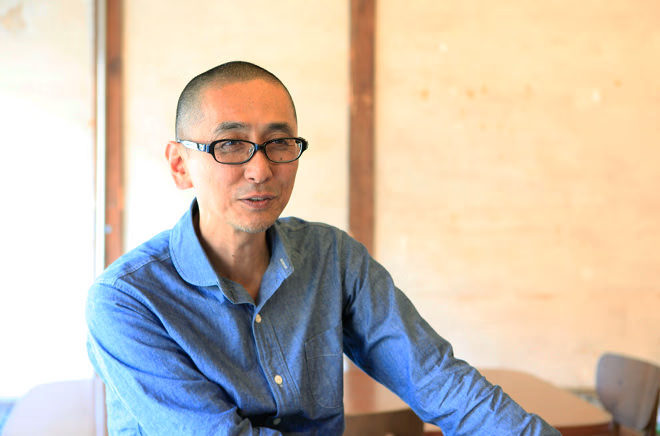
Manabe
It's rare. But how is it rare? Because we don't really know.
Nishimura
I see. Well, maybe it's just something unusual for me.
I worked for a large company until I was about 30 years old.
In short, it's a world where you work under a company name.
So, when you work at a big company, people tend to make a lot of mistakes.
Even though it was through no effort of my own, my business partners treated me with great care, and just by saying I was someone from such and such place, I got a lot of attention.
It's easy to get confused about the distinction between the company and yourself.
Even though it wasn't my own power.
Monosus is not a brand name company as its owners mistake it for being.
On the other hand, there are many companies that treat it like a club activity and act like, "We're having fun!"
But it doesn't seem that way, from my perspective.
Looking at the current Monosus website, it does have a club-like atmosphere, but it also looks like everyone is working pretty diligently.
It doesn't feel like a club activity, but it doesn't feel like it's company work either.
I think that balance is rare.
When I visited the office for the first time, it reminded me of the IDEE office in Aoyama.
Manabe
That's a huge compliment, isn't it? (laughs)
Nishimura
Oh, I see.
Manabe
For me personally (laughs).
Nishimura
In the past, IDEE was heavily renovated and expanded.
It's a store, so the shop is there and it's a public space, but if you go to the back there's a huge space for staff members.
The feeling was very similar.
Manabe
That might be quite pleasing.
Nishimura: It feels like it's a place that we run ourselves.
Rather than working in a designated space, it felt like I was building a nest, which I thought was interesting.
Connection with Manabe
Manabe
Well, I'm still working on building the In Kamiyama website.
They are also involved in the Food Hub Project , which is quite a large project, and we work together on it.
So, I'd like to briefly talk about the connection between me and Mr. Nishimura.
*Note: In Kamiyama is the website of the NPO Green Valley, based in Kamiyama Town.
Food Hub Project: A new project jointly carried out by Kamiyama Town Office, Kamiyama Tsunagu Corporation, and Monosus.
Nishimura
Well, it first started when he came to interview us about the work of Living World , a design firm that I run with my wife, for an article in a car company's newsletter.
In those kinds of interviews, the writers and editors are the ones taking the lead, so I often find myself wondering who the person smiling in the back is (laughs).
Manabe
It was that smiling guy, right? (laughs)
Nishimura
That's what it was. Now that I think about it, I remember seeing a silhouette of a shaved head there (laughs).
That's how it felt at the time, so my impression of it was a bit off.
From then on, I started renting a house in Kamiyama and commuting to Kamiyama from Tokyo on a late-night bus, which was about two and a half years ago.
Then, around the end of that year, I suddenly got a call from Manabe.
We met to see if we could help with planning the redevelopment or reuse of a certain vacant lot in Tokyo.
Also, we had a lot of mutual acquaintances, and they were like, "Oh, you're moving to Kamiyama?" "Me too." That's how it felt (laughs).
From there the relationship started again.
Manabe
I agree.
Nishimura
After that, he approached me a few times to talk about various work-related matters.
Maybe Manabe Taichi is a person with a good sense of smell.
I don't mean that I've struck gold or anything like that, but I think that I have the ability to sniff out the perfect person at each stage.
So as we spent time together and talked about work, he suddenly mentioned something like, "I want to start this kind of thing in Kamiyama."
So, around June 2015, there was an idea to organize a "Local Revitalization Working Group" in Kamiyama town, made up of 14 residents and 14 young people from the town hall.
*Note: A working group considering regional revitalization in Kamiyama Town. After holding multiple meetings, they announced a regional revitalization strategy entitled "Project to Connect the Town to Future Generations."
When I was thinking about who to ask to be part of the team, with Ominami from Green Valley, we were told, "It would be great if Manabe was involved, but he's busy so that probably won't be possible."
Manabe-san was hardly ever in town (laughs).
But I said, "I'll just ask."
So I called out to him,
"Oh, I might want to try that. It would give me an excuse to be in town," was the response I got.
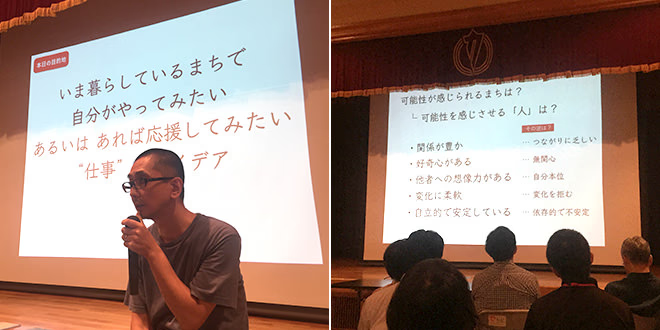
The Regional Revitalization Strategy presentation. The Regional Revitalization Working Group held study sessions and discussions over six months.
Manabe
That's right. After I was eliminated from the selection process, I got an email from Nishimura saying, "Please let me do it as it will give me an excuse to stay."
Nishimura
So, Ominami said, "Manabe, that's OK. In fact, I'd like to do it." "Oh, I guess I should ask" (laughs).
There were two things I did last year.
First of all, we want to create an environment where everyone can think about things like "town development" and "the town's future," which are difficult to think about in everyday life.
The second was to develop ideas for the town about what to do next, not just ideas, but ideas that were based on the overlap of the individual's potential capabilities (abilities), hopes (wishes), and the desired form of the town (should).
I would observe the mood at each meeting, and I felt that Manabe's actions were very much in line with what the town needed right now.
So it wasn't something I planned, it just happened very naturally.
Manabe
That's true.
Nishimura
Personally, I think he complained about it a couple of times at the beginning (laughs).
"I just wanted to do it quietly at home, but it turned into something I couldn't back out of" (laughs).
Manabe
There was a lot of pressure (laughs).
Nishimura
So I just ignored it (laughs). If it really was impossible, then I would think, "Well, we have to do something about it," but for the time being, that didn't seem to be the case.
What is born from affinity
Nishimura
Right now, I am working with Manabe and the other people at the town hall, including on the food hub, but the worst thing about when the government tries to do something is that they tend to think that it has to be equal no matter what.
I believe that there should be no favoritism and that opportunities should be equal.
But I don't think that's the case.
For example, when it comes to relationships between men and women, when it comes to deciding who to date or live with, there's no such thing as equal opportunity or equality, right? (laughs) It's the same in the community. When you're trying to become a force for good, you're bound to meet people like this.
Manabe
yes.
Nishimura
These encounters become a source of strength.
So if we get too hung up on things like equality, the power that we have is going to be lost.
So, in order to move things forward organically, I think it's important to have lots of casual, trivial conversations.
What does that guy want to do? This guy has this kind of hidden power? This kid's nostrils get bigger when we talk about this subject (laughs).
I think that when everyone knows each other well, it's an environment where a lot of different things can happen. Manabe and I worked together on a project before the Kamiyama Regional Revitalization Project, so we've had some experience together, and that's been working well.
I'm currently spending a lot of time with the members of Monosus, so we have a relationship that makes it easy for organic projects to emerge.
I think it's better for everyone to work based on compatibility and things like that.
I think work at a company or a government office is often decided on the basis that "this is work," and is not based on compatibility at all.
But I think it's important to treasure the things that come from compatibility.
Especially when doing something new.
Manabe
No, that's true.
Nishimura
So, I think a lot of things will continue to happen in the future, but that's what Monosus is like.
Thank you for your continued support.
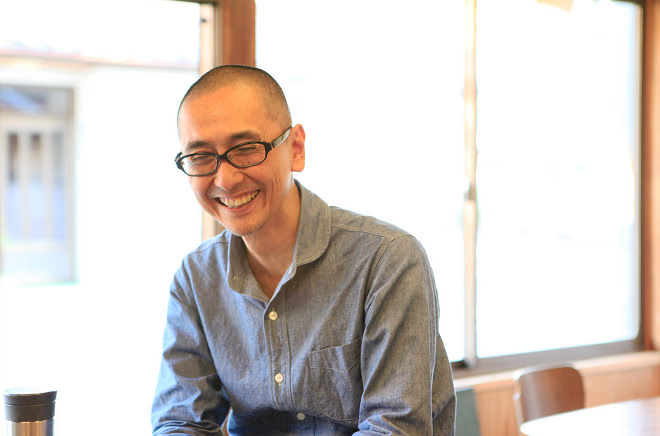
Manabe
I appreciate your help. Thank you very much for today.
Looking back on the interview
How to work + how to live = how to do business
Recently, I had the feeling that Nishimura had been avoiding the title of "work style researcher." I thought that if I could find out the reason, I might find the answer to a certain question that I have been vaguely harboring, so I mustered up the courage to ask him.
Recently, Monosus has been focusing on "working with people who want to live together." In this column, we try to convey this message through interviews with people who are closely related to us, but what does it actually mean to "live together"?
I remember that the CEO, Hayashi, said a while ago, "I think of Monosus as a village, and I'm the village chief." At that time, I commented, "The village chief is something that is chosen, so if the owner of the company (Hayashi) is the CEO, isn't it essentially different?" However, in reality, isn't the beginning of the village similar to what we now call a venture company? Things start with someone's desire to do something. Recently, I've been deeply involved with Kamiyama Town and the local people, and I've come to think this way.
In yesterday's post (Part 1) , Nishimura talked about "running a business rather than working."
To borrow Nishimura's words, rather than saying that I "work" at Monosus, I would say it's closer to saying that I "run my business" with Monosus, including both my work and my life.
CEO Hayashi described the collection of these situations as a "village," and Nishimura may have described Monosus as a "rare company."
I think that my personal relationship with Mr. Nishimura is more like we are "running" together than we are "working" together. Proceeding with things organically is not the same as leaving things to nature. I think Monosus will continue to seek out our own way of "running" together, with the help of many people and through trial and error.
(Taichi Manabe)
